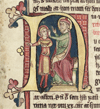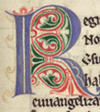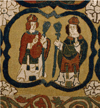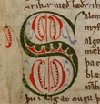Medieval Nordic Text Archive (Menota)
Background
Menota is a network of leading Nordic archives, libraries and research departments working with medieval texts and manuscript facsimiles. The aim of Menota is to preserve and publish medieval texts in digital form and to adapt and develop encoding standards necessary for this work. The archive will contain texts in the Nordic languages as well as in Latin. There are now 16 members of Menota (see bottom of the page) and new members are welcome to join the network. Since its founding in 2001, the archive has been led by Odd Einar Haugen at the University of Bergen and Alex Speed Kjeldsen, the University of Copenhagen. Since 16 May 2025 has Beeke Stegmann, Árni Magnússon Institute for Icelandic Studies, taken over as new leader.
News (in Norwegian/Danish)
- Hele Möðruvallabók (AM 132 fol) er nå publisert i Menota (10.01.2025).
- Utgaven av eddadiktene i Editiones Arnamagnæanæ Electronicæ er fullført (03.12.2024).
- Til minne om Rune Kyrkjebø (18.01.2024).
- Arkivet har modtaget de første danske tekster – tilmed i runeskrift (25.02.2023).
- Full morfologisk og syntaktisk annotasjon av Konungs skuggsjá (31.05.2022).
- Riksbankens Jubileumsfond gir generøs støtte til digitaliseringsprosjekt (29.10.2021).
Text archive

Menota can now offer almost 100 Medieval Nordic texts (a total of over 2 million words), several of which are fully lemmatised. The majority of the texts are Old Icelandic or Old Norwegian, but there are also some Old Swedish texts and a couple of Old Danish ones. Latin texts (from the Nordic countries) are most welcome. A catalogue with full search facilities was opened on 29 June 2007.
The texts have been encoded on one or more levels. The most widely used level is the diplomatic level (as seen in many Old Norse editions), while some texts have also been encoded on a facsimile level (i.e. in a very close transcription) and some on a normalised level (as in the Íslenzk fornrit series). These levels are specified under Facs, Dipl and Norm in the catalogue. By clicking the file name in the second column of the catalogue, you will be able to read the text on one or more levels, depending on how many levels have been encoded.
The archive also contains around 180 charters (diplomas) in Norwegian. All charters up to and including 1310 is included in this selection, as well as a few younger ones.
Finally, the archive contains a selection of 100 Norwegian inscriptions in the younger runes.
The archive has been built in the Corpuscle application at the Clarino Bergen Center, UiB.
See our User guides for an explanation of the catalogue, the display of texts and the critical symbols being used. It also informs about various types of queries that can be made in the archive.
Encoding guidelines

The Menota handbook offers detailed advice on the encoding of medieval manuscripts in XML, all necessary schemas for doing this, and a full tutorial for first-time encoders. It is compatible with version P5 of the TEI Guidelines. Odd Einar Haugen has been the general editor of the handbook up to an including version 3.0. So far, no less than 17 textual scholars from Iceland, Norway, Sweden, Denmark and Germany have contributed to the handbook.
Version 4.0 is presently in preparation and has Beeke Stegmann as the general editor. In addition, there will be a number of chapter authors, as in earlier versions of the handbook.
- The Menota Handbook v. 3.0 (the latest complete version, published 12 December 2019)
- The Menota Handbook v. 4.0 β (in preparation, so far a few chapters have been published in draft)
Older versions: The Menota Handbook from v. 1.0 onwards.
Translations

Menota now publishes translations of Medieval Nordic texts. At first, two texts are
offered, Jóns saga helga and Niðrstigningar saga, but we soon hope to welcome more translations in the archive.
The translations will be published in open CC licenses. For the time being, they will be published in PDF.
- Translations (catalogue set up 1 October 2016).
Menotec project

Menotec was an infrastructure project funded by the Norwegian Research Council (2010–2012) with the aim of transcribing and annotating a corpus of Old Norwegian texts. The transcribed texts have been (and will be) published in the Medieval Nordic Text Archive, while the annotated texts have been added to the treebank of the PROIEL project, as well as being made accessible through the INESS portal. More.
Lexicographical resources
Several dictionaries of Medieval Nordic languages are accessible on the web. They are presently in different formats and the interfaces are not uniform, but they do represent an extremely useful resource:
- Fritzner’s dictionary (Icelandic and Norwegian)
- Söderwall’s and Schlyter’s dictionaries (Swedish) – queries in Fornsvensk lexikalisk databas
- Kalkar’s dictionary (Danish) – scanned images of the printed dictionary (launched in 2000)
- Kalkar’s dictionary (Danish) – full search capabilities (launched in 2017)
A project headed by Hans Fix, University of Greifswald, has made Walter Baetke’s Wörterbuch zur altnordischen Prosaliteratur accessible in an updated version for free usage. The dictionary can be downloaded as a PDF file (75 MB). A fast connection is thus essential.
- Walter Baetke’s dictionary digital (link to registration page)
Ongoing dictionary projects:
- Ordbog over det norrøne prosasprog (Icelandic and Norwegian)
- Gammeldansk ordbog (Danish) – presentation of the dictionary project
- Gammeldansk ordbog (Danish) – beta version of the dictionary with search capabilities
Special characters
Many texts in Menota contain a number of special characters, especially at the facsimile textual level. Menota adheres to the recommendations of the Medieval Unicode Font Inititative, which offers an extensive overview of relevant special characters, and from which several free fonts with these characters can be downloaded:
Foundation
Menota was established on 10 September 2001 at a meeting in Oslo between major Nordic institutions.
Statutes
The Menota statutes were passed at the council meeting in Reykjavík on 6 September 2003.
Council
The council is an advisory body in which each participating institution is represented by one member. Different departments or sections at the same university are recognised as individual institutions. In addition to the permanent members, other representatives may join the meeting at the discretion of the board.
- Menota’s council 2022-2024
- Menota’s council 2019-2021
- Menota’s council 2016-2018
- Menota’s council 2013-2015
- Menota’s council 2010-2012
- Menota’s council 2007-2009
- Menota’s council 2004-2006
- Menota’s council 2002-2003
- Council meeting (hybrid), Reykjavík 19.08.2022
- Council meeting (digital), Reykjavík 23.08.2021
- Council meeting (digital), Reykjavík 24.08.2020
- Council meeting, Bergen 26.08.2019
- Council meeting, København 24.08.2018
- Council meeting, Oslo 01.09.2017
- Council meeting, Uppsala 26.08.2016
- Council meeting, Reykjavík 21.08.2015
- Council meeting, København 22.08.2014
- Council meeting, Oslo 23.08.2013
- Council meeting, Stockholm 31.08.2012
- Council meeting, Reykjavík 26.08.2011
- Council meeting, København 03.09.2010
- Council meeting, Oslo 27.08.2009
- Council meeting, Stockholm 29.08.2008
- Council meeting, Reykjavík 31.08.2007
- Council meeting, København 25.08.2006
- Council meeting, Oslo 09.09.2005
- Council meeting, Stockholm 17.09.2004
- Council meeting, Reykjavík 06.09.2003
- Council meeting, København 14.09.2002
Board
The council appoints a board for a period of three years. The board for the current period (2025-2028) is:
- Tarrin Wills, Denmark
- Beeke Stegmann (chair), Iceland
- Juliane Tiemann, Norway
- Lassse Mårtensson, Sweden
- Alex Speed Kjeldsen, Denmark
- Haraldur Bernharðsson, Iceland
- Robert K. Paulsen, Norway
- Ingela Hedström, Sweden
Handbook contributors
The Menota handbook version 3.0 was published 12 December 2019 on this site. The contributors in this version are Odd Einar Haugen (general editor), Ivar Berg (Trondheim), Haraldur Bernharðsson (Reykjavík), Marco Bianchi (Uppsala), Alex Speed Kjeldsen (København), Robert K. Paulsen (Bergen), Friederike Richter (Berlin), Beeke Stegmann (Reykjavík), Nina Stensaker (Bergen) and Tarrin Wills (København).
There are minutes from several of the meetings by the contributors to the handbook.
- Editorial meeting, København, 25.01.2019
- Editorial meeting, Oslo, 31.08.2017
- Editorial meeting, Uppsala, 27.08.2016
- Editorial meeting, Bergen, 21-22.06.2006
- Editorial meeting, Bergen, 12.04.2005
- Editorial meeting, Stockholm, 18.09.2004
- Editorial meeting, København, 26.03.2004
- Editorial meeting, Bergen, 18.01.2003
- Editorial meeting, København, 01.12.2001
Depositor license
Menota now welcomes texts from other institutions or individual researchers, but cannot presently offer assistance in converting texts to XML. Please contact one of the board members (see above) if you would like to deposit a text in the archive. We encourage potential depositors to read the encoding guidelines in the Menota handbook and validate the text against the Menota DTD contained in the handbook. Sample XML files are available for inspection and comparison. The Menota depositor license, which is based on a corresponding document used by the Oxford Text Archive, has parallel Norwegian and English text. Please note that the depositor keeps all his or her intellectual rights to the text after depositing it in the archive. The same text may be withdrawn at any time and also published in other archives and other formats at the depositor’s will (cf. section 3.4 in the license):
- Depositor license - v. 1.2 (8 September 2003)
- Depositor license - v. 1.3 (1 September 2015)
Cooperating institutions
- Institut for Nordiske Studier og Sprogvidenskab (NorS), Københavns Universitet (including Den Arnamagnæanske håndskriftsamling and Ordbog over det norrøne prosasprog
- Det Kongelige Bibliotek
- Det Danske Sprog- og Litteraturselskab
- Arkivverket
- Institutt for nordiske og lingvistiske studier, Universitetet i Oslo (including Tekstlaboratoriet)
- Institutt for lingvistiske, litterære og estetiske studier, Universitetet i Bergen
- Universitetsbiblioteket i Bergen
- Nasjonalbiblioteket

